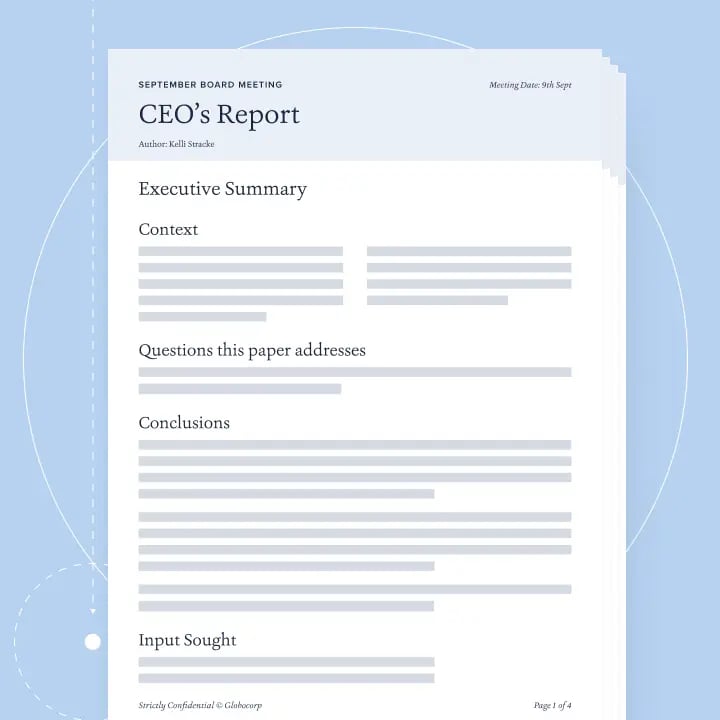Jocelyn Stuart-Grumbar is Chief Executive of The Clothworkers’ Foundation and Clerk to The Clothworkers’ Company. Prior to this, Jocelyn worked as an international business-builder Director at Xeros, Dyson and Diageo.
What change would you make to boardrooms to make them more effective?
I do abhor things like unequal pay, I can’t believe it’s taken so long to address. So, having genuinely more diverse boards where people are paid the same rate for the same job is the way to go. But that’s incredibly obvious, and you wonder why we haven’t actually got there yet.
How you tap useful insight across generations and different social groups strikes me as a bit of a challenge for boards. They typically rely on marketing departments to do that for them. Better access to insight from more diverse groups would be useful.
What are your thoughts on having employees on boards?
I think it would probably be quite tricky given the sensitive nature of what’s being discussed, but I think boards should try much harder to bring in somewhat unfiltered insight from all levels of the organisation. It’s difficult to say how — it’s going to depend on scale and geography. There is a lot to be learnt in terms of sensible everyday wisdom from people that do the everyday jobs.
What does good governance look like to you?
I think governance is an ugly word, but there are too many examples of malfeasance, bad practice and poor management. Governance needs to be demystified. I suspect that if you asked most directors who have fiduciary responsibility to outline what’s important about corporate governance, they’d probably struggle. They’d say we need to be transparent and we need to avoid hidden agendas, but they wouldn’t necessarily be able to pinpoint the key elements.
Really, there should be four or five key tenets that are well understood, and that consumers know large organisations respect. These aren’t necessarily legally sanctionable requirements but could be guidelines, best practice or strong advice. I think there should be a light version for smaller businesses, so that it’s easy to get into good habits.
What’s your biggest bugbear around board information?
My biggest bugbear is the sheer bulk. If you’re conscientious, and particularly if you have a fiduciary responsibility, then you cannot claim ignorance or not to have had time to read the papers. In reality, if you only have so many hours in the day and very tightly grouped meetings, this becomes a real challenge.
I think people need to be thoughtful about how they construct documents. I’m a great believer in a really well-honed Executive Summary, but the risk is people only read the Executive Summary. We flag what we’re looking for at the top of the document, so it is absolutely clear what the action that we’re seeking is.
How does a good Executive Summary transform the conversation in the boardroom?
It’s much more likely that if you have a long document that doesn’t pinpoint or signpost what’s being sought from the board, the most vocal in the room will hijack discussion. The chair must then keep reigning in and repointing conversation. That becomes difficult as you spend 10 minutes talking about something and then don’t have time to talk about what you need to. You’re then forced by time into a decision that’s not very well considered because you simply can’t wait another three months for the next board.
What should government be doing to help businesses?
In general terms I believe the government should set a clear simple framework for good governance, creating an economic environment where businesses can thrive, and then get out of the way. Thriving businesses employ people — anything that creates bureaucracy and costs for a business is essentially a tax on jobs.
I believe in clear governance — simple and actionable, not necessarily legally sanctionable, but good clear guidelines which are well understood, not only by those that run a business, but by those that work in that business too.
What book is on your bedside table?
It’s a book I absolutely love and have read a couple of times — it’s called ‘Snow Falling on Cedars’ by David Guterson. It’s a wonderful book about Japanese Americans who found themselves stuck in the USA after Pearl Harbor. It’s an amazing read, it continues to resonate with me so I would recommend that very highly.
And finally, what is your Golden Rule?
I really ought to live this more fully: I try to make sure I’m hearing the contrarian voice. If you sense someone has a different perspective, go looking for it and make sure you understand it — make sure the slightly more laterally-thinking person is heard.
A good Non-Exec often fills this contrarian role: being Chairman or Chief Executive of a business is an incredibly lonely job — you need a critical friend.

A thinking and writing platform that helps you to write brilliantly clever and beautiful reports that surface breakthrough insights and spur your business to action.
Find out more


